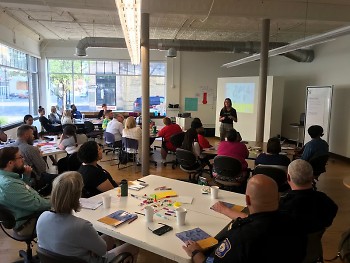"It gives a sense of hope, and feeling that there is a community here that has your back. Reminding us that we are one,” says Kim Van Driel, Downtown Grand Rapids Inc.'s Director of Public Space Management. She's referring to a new Heartside mural by artist Bryan Kosciolek titled "Love Yourself" at 310 Commerce. This mural is one piece of Heartside's community initiatives to promote self-care strategies for residents and visitors this season.
“Take care of yourself, find ways to be content with a situation and ways to be mentally balanced,” artist Kosciolek shares as he discusses what self-care looks like for him, especially during a pandemic. Over the course of his time working on the mural, he says he established a sense of connection to the community as people would interact with him. “The project provided a very organic environment to do so,” he comments. Kosciolek hopes when people look at the piece, they’ll think about “how to relate to your community, planet, to yourself.” He also sees an opportunity to inspire viewers to take action in caring for themselves and their community. Van Driel agrees, adding, “sometimes it’s hard to remember to love yourself, and you just need that positive reinforcement. A friendly reminder that you are loved and to love yourself."
Because of a larger push in Heartside for community self-care, Dwelling Place was excited about the mural being installed on their building. Community advocates during the 2018 Quality of Life Study ranked "community mental health" as a priority for future neighborhood investment, and residents have been actively involved in pursuing this topic. Resident driven peer support groups such as Aspire Academy, organized by Dwelling Place resident Doreen Timmers. She explains the group as somewhere “people with mental health questions and concerns can get help getting through their day”. They offer classes, do art together and will meet one on one if necessary.
Experiencing art is an effective way for Heartside residents to love themselves. “Creative expression is a powerful tool. It can be used to heal, provoke, enlighten, challenge, engage, and educate," says Van Driel of the community value of art. She adds, noting wellness, that "it is proven that looking at works of art reduces stress.”
Another community resource for mental health is the Mental Health Foundation of West Michigan, who offers training for schools, businesses and communities. With funding from DGRI, Dwelling Place will be hosting the Mental Health Foundation of West Michigan for their be nice. training on Wednesday, November 4, 2020 from 1-3 via Zoom. The be nice. training teaches an overview of mental health that includes signs and symptoms and how to start a caring conversation following a four-step action plan. The plan acts as a mental health education tool that empowers participants with knowledge so that they can understand their own mental health and how to help others who may be struggling.
Just like loving yourself looks different to each person, self-care does, too. Timmers has been “making sure she’s gotten out of the apartment somehow, whether it’s taking care of her daughter’s horse or going on a walk,” as part of her COVID-19 self-care routine. She adds, “keeping your health up is important. Getting enough sleep, eating well. Those are very important to your overall mental health. Do what you need to do to take care of YOU!”
With a mission to improve the lives of people by creating quality affordable housing, providing essential support services and serving as a catalyst for neighborhood revitalization, Dwelling Place serves families and people in 4 counties across West Michigan. Dwelling Place is powered by volunteers and numerous staff persons, guest writers create our Rapidian content. Thanks to Learning Lab intern Nika for writing this piece!
The Rapidian, a program of the 501(c)3 nonprofit Community Media Center, relies on the community’s support to help cover the cost of training reporters and publishing content.
We need your help.
If each of our readers and content creators who values this community platform help support its creation and maintenance, The Rapidian can continue to educate and facilitate a conversation around issues for years to come.
Please support The Rapidian and make a contribution today.

